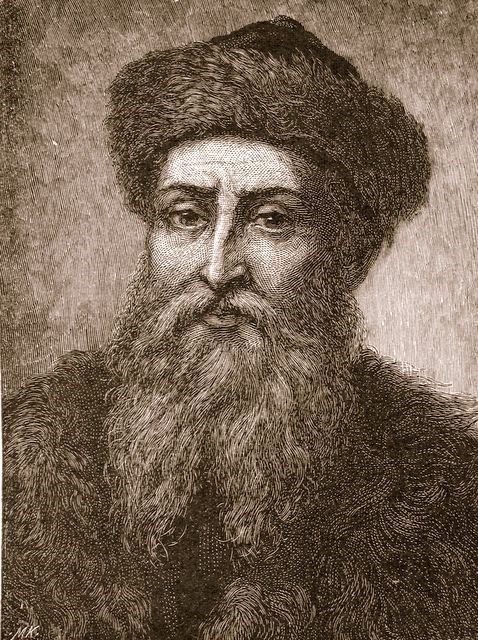 |
| Johann Gutenberg (1398-1468) (http://timerime.com) |
Johann Gutenberg was one of the most important people in literacy and science today. Johann definitely fits the name "Renaissance Man", which is someone who pushes the limits of literacy, art, science, and technology. Without Johann people would have never been able to read books and learn new things.
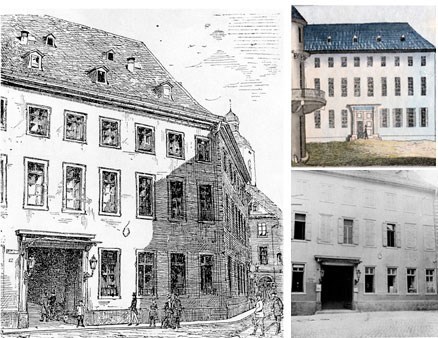 |
| Hof zum Gutenberg family mansion (http://mainz.de) |
Johannes Gensfleish zur Laden zum (Johann Gutenberg), was born in Mainz, Germany, in 1398. Johann started using the last name Gutenberg when he first started school. He got this last name from his mother's side of the family, they had a family mansion called, "Hof zum Gutenberg." Johann always thought that at least one of his mother's sons' should carry on the family name Gutenberg.
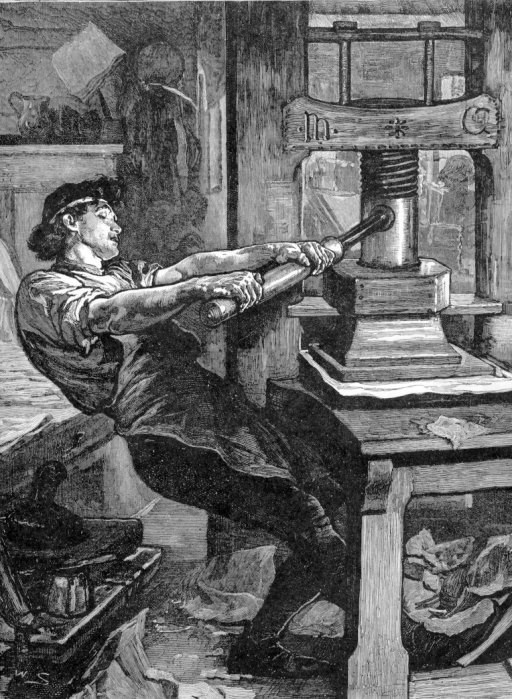 |
| Gutenberg's start of his career (http://www.uh.edu) |
In the early start of Gutenberg's career, he had worked as a goldsmith, served as a policeman, and also worked with mirrors. His father was a big inspiration for Gutenberg because he was also a goldsmith, and a merchant. As a young adult, Johann had ideas to create a new way that books could be printed mechanically. He became a "skilled metalsmith ans could cut precious stones, coin money, and create jewelry." (Streissguth) Johann had shared these ideas with a few of his friends and taught them his secret profession of printing. A few years later he had started experimenting with printing.
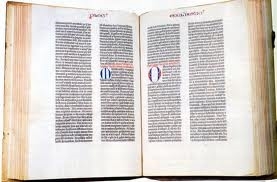 |
| 42-line bible (http://studyblue.com) |
At this time, though, materials for printing and making type were very expensive, and often he ran out of money from a loan and was faced in court. One time this happened he was in a partnership with Johann Fust. Together they had made a mechanical printer and printed the 42-line Bible, also known as the Gutenberg Bible or the Mazarin Bible. "The 42-line Bible became popular for its 42 lines on a page, there are only 40 original copies left." (Britannica Encyclopedia) This was a good deal until Gutenberg ran out of money and was faced in court with Fust. Fust had gained control of everything they had created and Gutenberg was left with nothing. Although he lost everything he created, experts have found intricate work left behind from Gutenberg in Fust's works, so Gutenberg has gained credit for the invention.
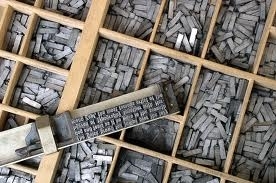 |
| Copper blocks used to print type (http://32rarebooks.com) |
Even though we know Gutenberg as the inventor of the printing press, there were people before him in China and Korea that had experimented with this process. In Korea they invented movable copper type and in China they had used wood blocks. There was also the fact that Marco Polo had printed the first book about the "Wonders of China", but in Europe his work was still unknown. After Gutenberg's invention of the printing press, literacy spread throughout Europe. Johann became known as the "true creator of the printing process." (Streissguth) With books being available to everyone and not just the Pope and Kings, people began to learn and didn't have to depend on the church anymore. Books then became so valuable that they often had to chain the books to the library shelves, to prevent people from stealing. Without Gutenberg, the printing process wouldn't have became so popular and changed the way people accessed books.
Page created on 2/21/2013 12:00:00 AM
Last edited 2/21/2013 12:00:00 AM
Chapter One: Johann Gutenberg, Streissguth, Thomas http://www. web.ebscohost.com/ehost
Columbia Electronic, Encyclopedia. "Johann Gutenberg." [Online] Available http://www.web.ebscohost.com/lrc/detail. 2013.
Streissguth, Thomas. "Chapter One: Johann Gutenberg." [Online] Available http://www.web.ebscohost.com/ehost. 2013.
Columbia Electronic, Encyclopedia. "Johann Gutenberg." [Online] Available http://www.web.ebscohost.com/ehost. 2011.
Brittanica, Encyclopedia. "Johannes Gutenberg." [Online] Available http://www.school.eb.com/comptons/article-9274706. 2013.
bio., True Story. "Johann Gutenberg biography." [Online] Available http://www.biography.com. 2013.
